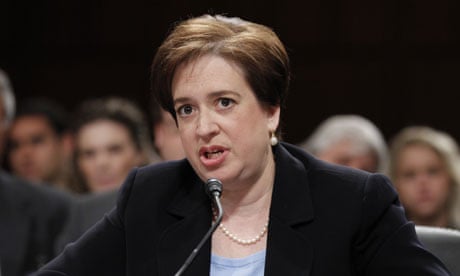Elena Kagan was confirmed by the Senate today as the new member of the nine-person supreme court, the highest judicial body in the US.
Kagan becomes President Obama's second successful pick for the court after Sonia Sotomayor, and the fourth woman to sit on it in its 221-year history. The Senate divided largely on partisan lines, voting 63 to 37 in her favour, with five Republicans breaking rank and supporting her, and one Democrat in opposition.
At face value, Kagan's appointment to the court, which lasts for life, will do little to change its political direction. She replaces John Paul Stevens, who retired in June and who regularly voted with the liberal wing of the court, despite having been chosen by the Republican president Gerald Ford in 1975.
Progressives hope that Kagan may be able to tilt the court a notch towards the left side of any argument, notwithstanding the usual five-to-four conservative-to-liberal split. Key will be how she interacts with Justice Anthony Kennedy, the justice who often acts as the swing vote.
Republican senators moved en masse to try to block her appointment, arguing that, as the only member of the current court who has had no direct judicial experience, she was not qualified. The leader of the Republicans in the Senate, Mitch McConnell, said: "Ms Kagan is not suited to assume a lifetime position on our nation's highest court." He described her as a woman "who has spent much of her adult life not steeped in the practice of the law, but in the art of politics".
Kagan, 50, did work as a clerk to the supreme court, but never as a judge. She was appointed by President Clinton to the US court of appeals, but his term in the White House ran out before she could be confirmed in the job. She went on to become a professor at the Harvard Law School, where she had previously studied, and then its dean. Obama appointed her in 2009 to be his solicitor general.
Kagan will be sworn in on Saturday but will not take her seat in the court until it resumes its business in October. She will be flung immediately into some of the most contentious issues in America, notably immigration.
